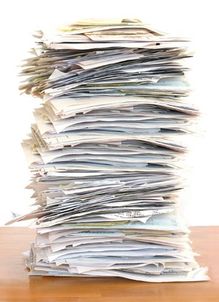|
What will happen to my Facebook account when I pass away?
Facebook has the option where you can set in advance whether you’d like to have your account memorialized or permanently deleted after you pass away. A memorialized account is a place for your friends and family to visit and share memories after a person has passed away. And since last year, Facebook now allows you to designate a “legacy contact” to manage your account. Once your account is memorialized, this person can post on your timeline after your death, such as share a final message. Other things he or she can do:
Your legacy contact currently is not able to:
If you want to designate your legacy contact:
Reference: https://www.facebook.com/help/1568013990080948
0 Comments
Spring is here, which means it’s time to finally clean up those papers that are piling up everywhere!
In this digital age, many people and businesses are going the paperless route. But many others tend to keep a ton of paperwork and let the paper pile high. Below is a guideline of what to keep or toss or shred (unless you are keeping things for tax purposes). And keep in mind that most statements, bills, etc. are available to view online. If you still can’t part with the paperwork, another option is to scan the documents and store the file on your computer. KEEP FOR 1-3 MONTHS:
KEEP FOR ONE YEAR:
KEEP FOR ABOUT 6-7 YEARS
KEEP FOR AWHILE:
KEEP FOREVER
A good rule of thumb if you’re deciding what to save or shred is to think about how difficult that document is to replace and if keeping these documents will make it easier for your trustee or personal representative to manage your affairs and your estate. Many times, clients have asked me where they should keep their trust documents. Safe deposit box? Fireproof Safe? The local bank? My trustee? My kids?
The answer is really simple: in a safe and reliable place. But what does that mean? Far too often, essential information is difficult to locate quickly and easily. For example, important papers may be stored in various hard-to-find places (ie. shoebox, kitchen drawer, scraps of paper in the garage or office). In an emergency, family members may have to scramble and experience anxiety because they have to search for indispensable documents, names of contacts or phone numbers. Your trust documents are very important and should be kept in a safe place. But they also should be readily available if your Successor Trustee needs access to it immediately. One of the reasons for this immediate access is that banks, stock transfer agents, and title companies may request to see your Trust (or Certification of Trust) so that they can verify that they are dealing with the right person. Because your Successor Trustee may need to act on a moment's notice, we recommend that you let him or her know where to find your trust documents. The most convenient place is somewhere in your home or office, but make sure it's protected from fire or floods, such as in a fire and water-proof safe. If you decide to put your trust documents in a fireproof safe at home, you may want to let your trustee know how to access the safe (ie. the combination). At a minimum, place your original estate planning documents on a high shelf in your home or office. That way the documents can be protected from floods, small children or pets. In addition to keeping your estate planning documents in a safe and accessible place, you may think about leaving copies of your bank statements, past tax returns, contact information of key persons along with your estate plan documents to make the job of settling your estate be much less of a burden for the trustee. Keep in mind that any kind of organization will be helpful to your trustee and beneficiaries. Having your documents in order means your personal and business affairs will be handled efficiently, quickly and accurately. And more importantly, your loved ones will be more easily be able to take care of you and your needs according to your wishes. |
About the AuthorChristine Chung, Esq. Archives
March 2020
Categories
All
|
|
Home | About Us | Attorneys | Virtual Services | Practice Areas | FAQs | Contact Us
© 2018 Law Offices of Christine Chung. All rights reserved. Disclaimer/Privacy Notice |




 RSS Feed
RSS Feed

